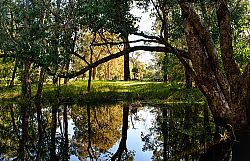

MPs have been warned that nature provisions in the Planning and Infrastructure Bill "go against the evidence and threaten to undo recent progress".
Economists, experts on nature, and former government advisers have signed a letter setting out their concerns about Part 3 of the Bill, ahead of its consideration at the House of Commons committee stage on 24 April. They have called for it to be paused.
The Bill includes provisions for a nature restoration levy payable by developers to Natural England in relation to a development for which an environmental delivery plan (EDP) applies.
Ahead of the publication of the Bill in March, a document entitled "Planning Reform Working Paper: Development and Nature Recovery" was published in December 2024, proposing that a Nature Restoration Fund would be established to enable developers meet their environmental obligations and deliver on the government's goal to deliver 1.5 million homes during this Parliament.
Professor Dame E J Milner-Gulland, who directs the Interdisciplinary Centre for Conservation Science at the University of Oxford, a signatory to the letter, commented: "Over the last few years, the UK has presented itself as a leader in innovative approaches to nature recovery, and a champion of biodiversity at home and abroad, with much cross-party support".
"Although taking a strategic approach to recovering nature in the context of other priorities is important, the planning and infrastructure bill is far too vague about how this would be done – and its ‘licence to trash’ provisions go against the evidence and threaten to undo recent progress. Nature is not an obstacle to prosperity, it underpins it".
In a statement, the signatories call the levy a "pay to pollute buyout mechanism", warning that passing Part 3 would amount to an "extraordinary rollback of critical nature protections", that have supported nature-positive development and growth in England for more than 40 years.
The letter to MPs says: "Under the proposed scheme, Natural England’s position will be deeply conflicted. Natural England will write the conservation plans and assess their success, all the while being reliant on the new nature levy income to fund its own administration. This is a clear conflict of interests, with no independent scrutiny and no mechanism to ensure protection for rare species before it’s too late. This comes at a time when new government policy will also require Natural England to regulate for growth, not the environment".
The signatories argue that the levy is not a targeted tool for nature recovery, but is a "blunt instrument that rewards bad planning and penalises good practice". They say it would add costs and delays to the planning process, as with previous community levy schemes intended to fund infrastructure such as roads, schools and GP surgeries.
According to the letter, the overall improvement test is "legally weak", allowing "vital safeguards to be dismissed".
"Even more troubling, the secretary of state for housing will have the discretion to determine whether this test is met, creating a dangerous loophole where political convenience can override ecological reality".
The District Level Licensing for newts scheme is cited as an example of being able to protect species and streamline development within the confines of existing laws.
Professor David Hill CBE, former Deputy Chairman of Natural England, a signatory to the letter, said: "I cannot believe we have come to this position. Under the watch of previous governments, the debate had always been around how far we should progress to increase protection and funding for nature and green growth".
"Now, regressive laws are being quietly accelerated through Parliament with no public consultation, impact assessments or pilots. Part III of the planning and infrastructure bill harms our economy, rather than helps it, and will deliver a profoundly unacceptable blow to our natural environment, which, unlike the economy, may never recover".
Professor Sir Partha Dasgupta, Author of the HM Treasury-commissioned Dasgupta Review on the economics of biodiversity, and a letter signatory, added: "Part III of the bill will cause economic harm, by introducing overlapping and clashing nature laws, and slowing development with complex viability-based levy systems that critically undermine the investment case for nature in the UK. Part III should not be rushed into law without a full understanding of the impacts Part III will have on our economy, and the environment on which it depends".
Other signatories to the letter include:
For more information on this subject, see: